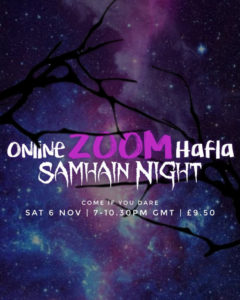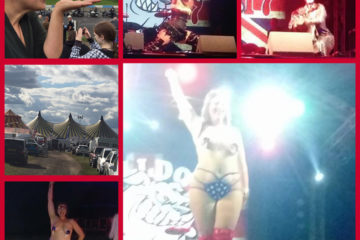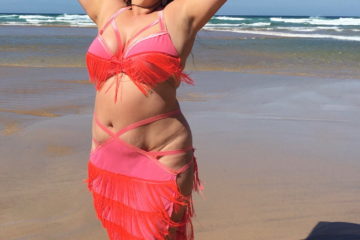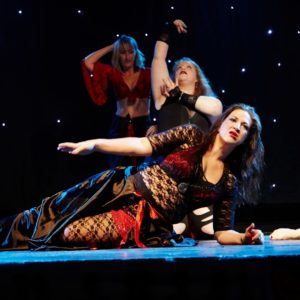
Alf leila Wa Leila- Arabian Rock Version
Samhain, Halloween and Belly Dancing!
Are you excited by the prospect of Halloween parties and celebrations? 1st October, is for some officially the start of the ‘Halloween’ season and getting creative with a Macarbe theme. We start to see Cats and witches hats popping up and incredible goth or skull style make up and black clothing contrasted with orange pumpkins. As I am busy prepping for our next Online Zoom Hafla, on 6th November, I find myself looking back on these photos from a 2014 spooky season show where the Arabellas performed to a rock version of Alf Leila Wa Leila by the Khallas and asking why is this dark theme fun, where has it come from and what’s it got to do with belly dancing?
Halloween Origins
It is quite widely known that the name ‘Halloween’, literally comes from the 3 day Christian Autumn Festival. Starting on ‘All Hallow Even’ the night before ‘All Saints’ Day’ on the 1st November followed by ‘All Souls day’ on the 2nd. This was and is a time to honour those recently passed and the Saints who’ve gone before. It was also a time to pray for souls stuck in purgatory, although this has lost popularity in recent times.
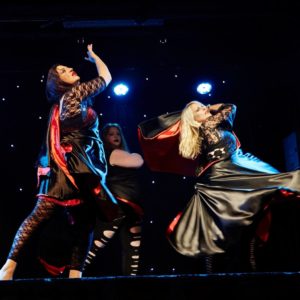
Alf Leila Wa Leila Arabian Rock version
Samhain, Pomana, Parentelia El Dia de los Muertos Festivals
Halloween a bit like Christmas, stands on the shoulders of ancient indiginious and often Pagan Festivals, which were appropriated and Christianised (Halloween from Pagan Ritual to Party Night, Nicholas Rogers). In the British Isles ‘Samhain’ or ‘Summer’s end’ marked the end of the growing period and preparing for Winter. It ensured the survival of the community in the dark times ahead. A watered down version of this survives today in the ‘Harvest Festival’ tradition celebrated in Schools and Churches. The Romans also bought echos of their Feast of Pomana, the goddess of fruits and seeds and Parentelia, the festival of the Dead to Britain.
The Irish took their Jack-O-Lanterns made from Turnips, across the pond and seeded the Halloween celebrations, is second only to Christmas in size and celebration business. This has grown alongside the Mexican Festival of ‘El Dia de los Muertos’, ‘Day of the Dead’. Questions are being raised as to the culturally appropriation of El Dia de los Muertos into Halloween. De Leon suggests that it is OK to join in sensitivily and honour your dead, but simply to dress up in a Day of the Dead costume and go partying is not OK (Independent 2nd Nov 2019.
Belly Dance haflas
So what does this mean for dancing? Well dancing is a natural joyous part of celebrations when communities come together, no where more so than in the Belly Dance community! But for me this seasonal theme is about intention and learning about the history of the culture you are celebrating.
This year my dance partner in Cairo Zara Dance and I have worked so much with source artists and honouring the origins of Belly Dance, that throwing a ‘Halloween Hafla’, just didn’t feel quite right. So we have gone back to the grass roots, where we are happiest and ‘Samhain Night’, the online zoom hafla is our seasonal celebration. We hope it honours our heritage as daughters of the British Isles and of the Belly Dance stars who have trail blazed before us. We hope you can come and join us in thanking all the teachers who lit the fire in our bellies for this dance. Please bring a candle to represent this and dress up or dress down in your own interpretation of Samhain and Halloween. Come with love in your heart to honour and celebrate and dance together and show our continued support to the Online Zoom Hafla Community through the dark times of lockdown. We can’t wait to see you all on 6th November!
